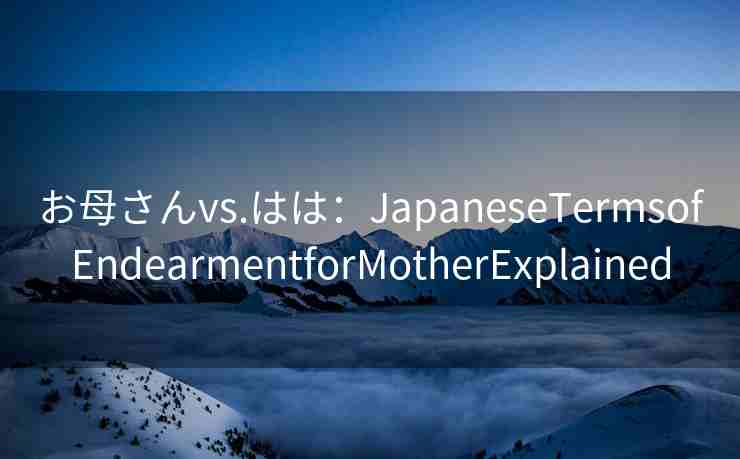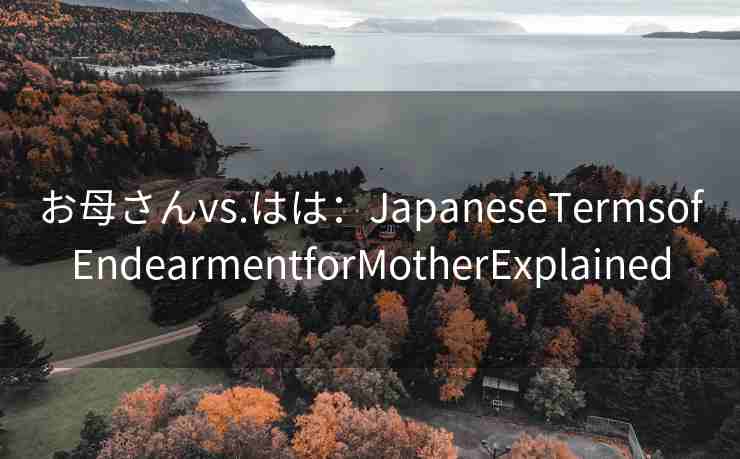お母さんvs.はは:JapaneseTermsofEndearmentforMotherExplained
Japanesecultureisrenownedforitsintricateuseoflanguage,whereseeminglysimilarwordscarrydistinctnuances.Whenitcomestoaddressingone'smother,theJapaneselanguageofferstwocommonterms:"お母さん"(おかあさん)and"はは"(はは).Whilebothareusedtorefertoone'smother,theyareemployedindifferentcontextsandconveyuniquefeelings.UnderstandingthedifferencebetweenthesetwotermscanhelpyounavigateJapanesecommunicationmoreeffectively,especiallywheninteractingwithfamiliesorexpressingyourownfeelings.

TheBasicsofお母さん(おかあさん)
"お母さん"isoneofthemostcommonwaystorefertoone'smotherinJapanese.Thetermcombinestwoelements:"お"(o),whichisapoliteprefixusedinmanyhonorificterms,and"母さん"(ははさん),whichisacasualbutaffectionatetermformother.Theadditionof"さん"(san)attheendaddsasenseofrespectandfamiliarity.Becauseofthis,"お母さん"iswidelyusedinbothspokenandwrittenJapanese,especiallyinsituationswhereabalanceofrespectandaffectionisdesired.
Infamilysettings,childrenoftenuse"お母さん"whenspeakingtotheirmothers,asitisatermthatshowsbothloveandrespect.Itisalsocommonlyusedinpoliteconversationswithothersaboutone'smother,suchaswhenfillingoutformsorintroducingfamilymembers.Importantly,"お母さん"isnotrestrictedtousewithinthefamily;itisatermthatcanbeunderstoodandusedbyanyone,makingitversatileforvarioussocialcontexts.
TheNuancesofはは(はは)
Ontheotherhand,"はは"(はは)representsamoreintimateanddirecttermformother.ThistermisrootedintheJapaneselanguage'sphoneticbase,asitisthesoundababymightmakewhenreferringtoitsmother.Unlike"お母さん,""はは"doesnotincludeanyhonorificelements,whichmeansitcarriesamorepersonalandlessformaltone.Thismakesitidealforusewithintheimmediatefamilycircle,especiallyamongcloserelativeswhoshareadeepbond.
Withinafamily,"はは"isoftenusedbychildrenwhenspeakingtotheirmotherinprivateorinsituationswheretheatmosphereisrelaxedandaffectionate.Itisatermthatconveysasenseofclosenessandfamiliarity,reflectingthedeepemotionalconnectionbetweenmotherandchild.However,itwouldbeunusualfornon-familymemberstouse"はは"whenreferringtosomeoneelse'smother,asitmightcomeacrossasoverlyintimateordisrespectful.
KeyDifferencesBetweenお母さんandはは
Tosummarizethedifferences,"お母さん"isamoreformalandversatiletermthatissuitableforawiderangeofsituations,includingconversationswithpeopleoutsidethefamily.Itstrikesabalancebetweenaffectionandrespect,makingitappropriateforbothcasualandformalinteractions.Incontrast,"はは"isamorepersonalandintimatetermthatistypicallyreservedforclosefamilymembers.Using"はは"conveysastrongsenseoffamiliarityandaffection,butitislessappropriateinsituationsinvolvingpeopleoutsidetheimmediatefamily.
UnderstandingthesenuancesisessentialforanyonelookingtomasterJapanesecommunication,asitreflectstheculture'semphasisonsocialhierarchyandemotionalcloseness.Whilebothtermsrefertothesamefamilialrelationship,theyareusedindistinctwaysthatreflectthedepthofthebondbetweenmotherandchildinJapanesesociety.
CulturalContextandEmotionalDepth
Thechoicebetween"お母さん"and"はは"isdeeplyrootedinJapaneseculture,wheretermsofendearmentareusedtoexpressbothloveandrespect.IntraditionalJapanesehouseholds,"はは"isoftenthetermusedbychildrenwhenspeakingdirectlytotheirmother,asitreflectstheintimateandunfilteredconnectionbetweenthem.Thistermisassociatedwiththewarmthandcomfortoffamilylife,representingthepureandunconditionallovethatexistswithinsuchabond.
Incontrast,"お母さん"ismorelikelytobeusedwhenspeakingaboutone'smotherinabroadercontext,suchaswheninteractingwithfriends,teachers,orhealthcareproviders.Itisaneutraltermthatavoidstheoverlyintimateconnotationsof"はは,"makingitsuitableforsituationswhererespectisimportantbutfamiliarityisnotappropriate.ThisdistinctionhighlightstheJapaneseemphasisonmaintainingpropersocialdistanceandhierarchicalrelationships,evenwithinthefamily.
AgeandRegionalVariations
AnotherfactortoconsideristheageofthespeakerandtheregionaldifferenceswithinJapan.InsomepartsofJapan,"はは"ismorecommonlyusedthan"お母さん,"especiallyamongyoungergenerationswhomaypreferamorecasualstyleofcommunication.Additionally,oldergenerationsormoretraditionalfamiliesmightprioritize"お母さん"tomaintaintheproperhierarchicalrelationship,evenwithinthefamily.

It'salsoworthnotingthatgendercanplayaroleinthechoiceofwords.Insomecases,daughtersmightuse"はは"morefrequentlythansons,astheytendtohaveacloserrelationshipwiththeirmothersinmanyJapanesehouseholds.However,thisisnotahardandfastruleandcanvarywidelydependingonindividualfamilydynamics.
EmbracingtheNuancesofJapaneseCommunication
ForlearnersoftheJapaneselanguage,understandingthesubtletiesbetween"お母さん"and"はは"canbechallengingbutrewarding.ThesetermsexemplifytherichlinguisticandculturaltapestryofJapan,whereeventhemostbasicwordscarrylayersofmeaning.Bymasteringthesenuances,youcancommunicatewithgreaterdepthandaccuracy,whetheryou'reinteractingwithfamilymembersorcasualacquaintances.
Moreover,appreciatingthesedifferencescandeepenyourunderstandingofJapanesecultureasawhole.Theemphasisonrespect,hierarchy,andemotionalbondsisreflectednotonlyinlanguagebutinsocialbehaviorsandcustoms.Bylearningtousethecorrecttermsintherightcontext,youcandemonstrateculturalsensitivityandbuildstrongerrelationshipswiththepeopleyouinteractwith.
Conclusion
Insummary,both"お母さん"and"はは"arebelovedtermsusedtoexpressaffectionandrespectforone'smotherinJapanese.While"お母さん"isaversatileandformallyappropriatetermformanysituations,"はは"representsamoreintimateandpersonalwaytorefertoone'smother.Byunderstandingtheculturalandemotionalnuancesbehindtheseterms,youcanusethemeffectivelyinyourcommunicationandgaininsightintothevaluesofJapanesefamilylife.
Masteringtheuseofsuchtermsisnotjustaboutlearningalanguage—it'saboutconnectingwithacultureanditspeopleonadeeperlevel.Whetheryou'reastudent,atraveler,orsomeonewithapersonalinterestinJapan,delvingintothesubtletiesofJapanesecommunicationcanbeanenrichingexperience.Sothenexttimeyouhear"はは"or"お母さん,"takeamomenttoappreciatetheloveandrespectbehindthesesimpleyetmeaningfulwords.
相关文章

最新评论